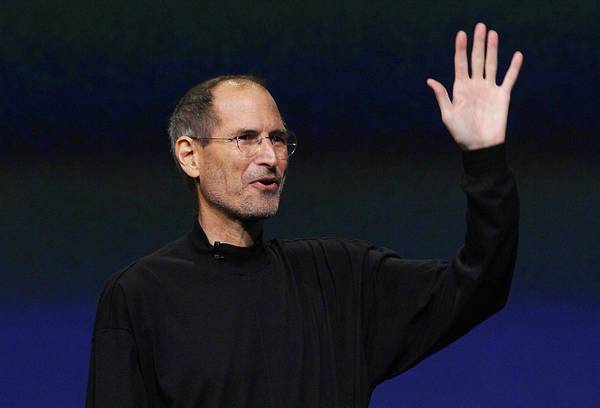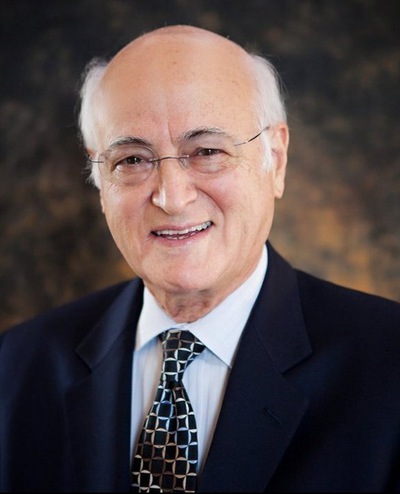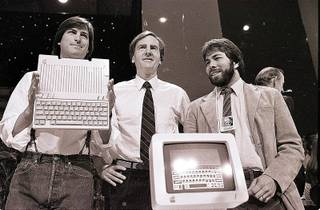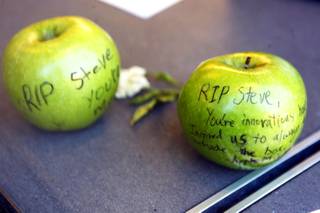Sun Archives
Steve Jobs never sought a relationship with his biological father, a Reno casino manager and one-time Las Vegas resident. But it turns out the pair shared at least one handshake before they ever knew they were related.
In his biography of the late Apple CEO, out in stores today, author Walter Isaacson writes that the pair met briefly when Jobs’ biological father, Abdulfattah John Jandali, ran a restaurant in Silicon Valley.
At the time, neither man realized they were father and son, and their meeting at the restaurant was strictly by chance.
“I remember meeting the owner, who was from Syria,” Jobs told Isaacson in an interview that aired Sunday night on "60 Minutes." “And I shook his hand and he shook my hand and that’s all.”
Jobs began searching for his biological mother in the 1980s, according to Isaacson. He met his mother, Joanne Simpson, who introduced him to his biological sister, novelist Mona Simpson.
“Then they go on a quest, a journey to find the birth father,” Isaacson told "60 Minutes." “Especially Mona wants to find what she calls the lost father.”
But when Mona Simpson found their father managing a restaurant in Sacramento, Jobs said he had no interest in meeting Jandali.
“I learned a little bit about him and I didn’t like what I learned,” Jobs said in an interview with Isaacson. “I asked her to not tell him that we had ever met and not tell him anything about me.”
Jandali, however, bragged to Mona Simpson about running “one of the best restaurants in Silicon Valley” where every one, “even Steve Jobs used to eat.” At the time, Jandali apparently had no idea Jobs was his son.
Later, after he found out, Jandali for years closely guarded the secret of his biological son from all but his closest friends.
He often lamented that he never met Jobs, telling a British tabloid that his Syrian pride wouldn’t let him for fear it would appear he was after his son’s wealth.
Jandali, 80, is general manager of Boomtown Hotel & Casino. He’s managed a variety of restaurants in Reno and Las Vegas and worked briefly as a political science professor at the University of Nevada, Reno in the late 1960s.
Joanne Simpson and Jandali, who met as graduate students, put their infant son up for adoption in San Francisco. The couple later married and had a daughter, Mona Simpson. They divorced, however, and Jandali had no hand in raising either of his children.
Jandali, who is described by friends as having a keen intellect and a calm and friendly demeanor, has granted few interviews. Most in Reno were unaware of his famous progeny.
In the "60 Minutes" interview, Isaacson noted that a sense of abandonment resonated throughout Jobs’ life — including in 1985 when he was kicked out of Apple.
“He always had that feeling of abandonment,” Isaacson said. “There was nothing worse than being abandoned by Apple.”
But Jobs’ adoption also gave him a sense of “being chosen” and special enough to attempt the seemingly impossible.
“I remember right here on the lawn telling (the girl from across the street) that I was adopted,” Jobs said. “And she said, ‘So does that mean your real parents didn’t want you?’ Ooooo, lightning bolt! I remember running into the house crying, asking my parents. They sat me down and said, ‘No, you don’t understand. We specifically picked you out.’”
That moment, that sense of being chosen, Isaacson said, “is the key to understanding Steve Jobs.”





Join the Discussion:
Check this out for a full explanation of our conversion to the LiveFyre commenting system and instructions on how to sign up for an account.
Full comments policy